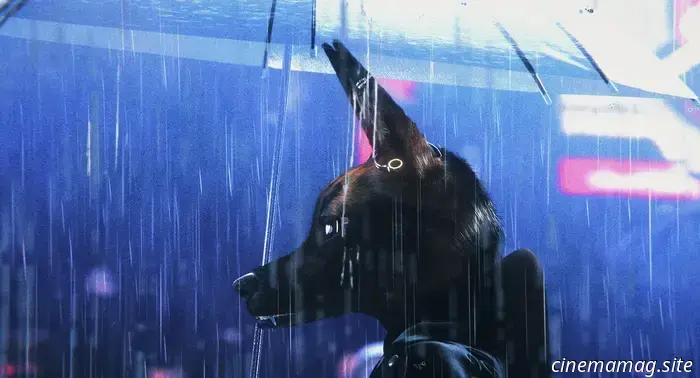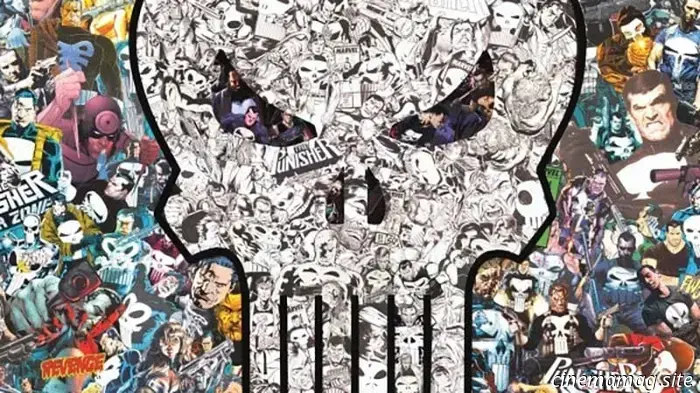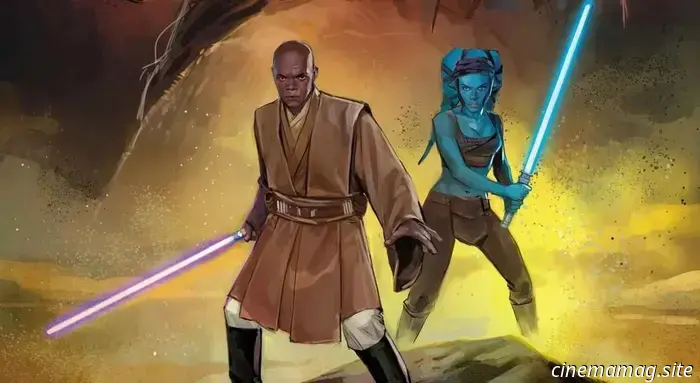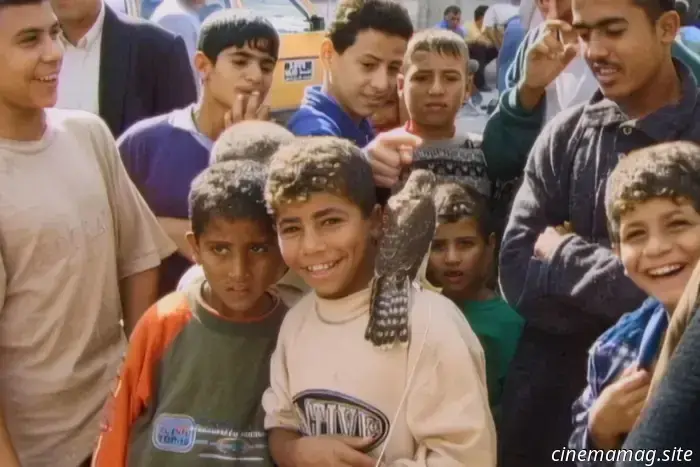
TIFF Review: Bouchra is a Visually Striking and Introspective Animation
Inspired by a real conversation shared between co-director Meriem Bennani and her mother, Bouchra (co-directed with Orian Barki and co-written by them along with Ayla Mrabet) begins with a phone call. Aicha (Yto Barrada) reaches out to her daughter from Morocco, prompting Bouchra (Bennani) to address a topic they’ve been avoiding for nearly a decade. Experiencing a creative block, Bouchra decides to seek emotional release by writing a script about the intricate relationship with her parents, hoping to gain perspective from their side.
While the nature of their unresolved issues is unclear, the tension becomes evident when awkward silences stemming from past trauma arise, leading Bouchra to leave her New York City home to reconnect with an ex-girlfriend, Nikki (Ariana Faye Allensworth). Her sexuality is a significant cultural point of contention, influenced by the societal norms surrounding Aicha and her husband's upbringing and faith. Although they have never outright disowned their daughter, they struggle with the associated shame. Bouchra has been compelled to hide her true self, which has taken a toll on her well-being.
This struggle manifests in the film Bouchra creates on colored storyboard cards, which appear both as sources for her drawings and as the final product derived from them. If Bouchra had been live-action, the narrative fluidity might have been interpreted as a fourth-wall break between reality and fiction; however, the Blender 3D animation transforms it into a semi-autobiographical fiction where Bennani and Barki navigate between the "real" Bouchra and Aicha and their cinematic versions. The characters primarily interact via phone calls, while “Film Aicha” (Dounia Berrada) is depicted in Morocco, where she lives and paints.
This creative approach results in a meta film that allows Bouchra to confront her inner demons and reconcile her emotions. Through their conversations, memories resurface like a long-forgotten letter, filled with avoidance and the need to disguise every new romantic episode as a "trip with friends." With the ocean separating them, Bouchra must find a way to express her pain. This leads to the introduction of potential Moroccan love interest Lamia (Salima Dhaibi), whose flirtation with Bouchra draws uncomfortable glances from "Film Aicha." Bouchra makes it impossible for her mother to ignore the reality any longer.
The audience cannot ignore it either, with two intimate scenes featuring torn underwear and passionate kisses. For every instance of Aicha hiding her face, there are two moments of Bouchra living authentically, unconcerned about others' judgments. This narrative does not center on self-loathing or insecurity as an openly gay woman; rather, it delves into the emotional gulf created by truth between her and her conservative family, who grapple with their love for their child against the ingrained disdain for homosexuality inherent in their religious beliefs. Bouchra yearns for her mother to know her fully.
As another phone call unfolds, creativity blossoms. The confrontational nature of Bouchra's choices is depicted from "Film Aicha's" fictional viewpoint, resulting in her counterpart treading carefully. The developing romance with Lamia accentuates the complications in Bouchra's genuine love life, considering her past with Nikki and the potential challenges of rekindling their relationship (whether public or private). Bouchra also relies on her best friend Yani (Barki) as a confidant to sort through her feelings… and pitch an extravagant (if unrealistic) million-dollar theme park concept.
Oh, and I should mention that all the characters are animals. Bouchra and her mothers are coyotes; Nikki is a cow; Lamia is a bear. This entire aesthetic feels like an R-rated, multicultural Zootopia (minus the one-dimensional racial allegory) that fluidly transitions between English, French, and Arabic. The choice of animal characters likely serves to distance the narrative from reality while also drawing on the tradition of using animals in children's stories to impart lessons. It probably also made it easier for friends and family to lend their voices by portraying "themselves."
This deep personal connection is evident—one can sense that the subject matter is significant to the filmmakers. It allowed Bennani to navigate her own familial identity crisis and helped her mother grasp the impact of her actions better, but Bouchra also serves as a model for others who might find themselves in similar situations. As with Bouchra and Aicha, prolonged silence can breed resentment, leading both parties to blame each other for not initiating a conversation. Aicha intended to grant her daughter agency but overlooked that Bouchra had already made the first move. With Bouchra acting as an icebreaker, clarity can emerge.
Bouchra had its premiere at TIFF.
Other articles
 Punisher: Red Band #1 - Comic Book Teaser
Frank Castle is making an impressive comeback this Wednesday as Marvel Comics debuts its new Punisher: Red Band series. You can check out an early look at the first issue below with the official preview… FRANK IS BACK! Refresh your memory and prepare, True Believers — Frank Castle has RETURNED. With no recollections, a full magazine, and […]
Punisher: Red Band #1 - Comic Book Teaser
Frank Castle is making an impressive comeback this Wednesday as Marvel Comics debuts its new Punisher: Red Band series. You can check out an early look at the first issue below with the official preview… FRANK IS BACK! Refresh your memory and prepare, True Believers — Frank Castle has RETURNED. With no recollections, a full magazine, and […]
 Star Wars: Jedi Knights #7 - Comic Book Teaser
Marvel Comics is set to release Star Wars: Jedi Knights #7 on Wednesday, and we have the official preview of the issue for you below; take a look… QUI-GON JINN IS DEAD! Or he will be… unless JEDI KNIGHTS MACE WINDU and AAYLA SECURA can locate the antidote to the poison that is threatening his life. The antidote can […]
Star Wars: Jedi Knights #7 - Comic Book Teaser
Marvel Comics is set to release Star Wars: Jedi Knights #7 on Wednesday, and we have the official preview of the issue for you below; take a look… QUI-GON JINN IS DEAD! Or he will be… unless JEDI KNIGHTS MACE WINDU and AAYLA SECURA can locate the antidote to the poison that is threatening his life. The antidote can […]
 TIFF Review: With Hasan in Gaza Faces Israeli Aggression with Poise and Remembrance
The recent documentary With Hasan in Gaza offers a moving and reflective depiction of a city currently battling for survival. It serves as both a travelogue and a time capsule. In 2001, filmmaker Kamal Aljafari traveled to Palestine with the intention of locating Adder Rahim, a friend he had made during his seven months in the juvenile section of Israel’s.
TIFF Review: With Hasan in Gaza Faces Israeli Aggression with Poise and Remembrance
The recent documentary With Hasan in Gaza offers a moving and reflective depiction of a city currently battling for survival. It serves as both a travelogue and a time capsule. In 2001, filmmaker Kamal Aljafari traveled to Palestine with the intention of locating Adder Rahim, a friend he had made during his seven months in the juvenile section of Israel’s.
-Movie-Review.jpg) Christy (2025) - Film Review
Christy, 2025. Directed by David Michôd. Featuring Sydney Sweeney, Ben Foster, Katy O’Brian, Merritt Wever, Ethan Embry, Chad L. Coleman, Tony Cavalero, Jess Gabor, Valyn Hall, Cole Pedigo, Bryan Hibbard, and Marvin LaViolette. SYNOPSIS Raised in West Virginia — her moniker, “Coal Miner’s Daughter,” comes from her father's job — Christy (Sweeney) was outstanding in athletics [...]
Christy (2025) - Film Review
Christy, 2025. Directed by David Michôd. Featuring Sydney Sweeney, Ben Foster, Katy O’Brian, Merritt Wever, Ethan Embry, Chad L. Coleman, Tony Cavalero, Jess Gabor, Valyn Hall, Cole Pedigo, Bryan Hibbard, and Marvin LaViolette. SYNOPSIS Raised in West Virginia — her moniker, “Coal Miner’s Daughter,” comes from her father's job — Christy (Sweeney) was outstanding in athletics [...]
-Movie-Review.jpg) The Man in My Basement (2025) - Film Review
The Man in My Basement, 2025. Directed by Nadia Latif. Featuring Corey Hawkins, Willem Dafoe, Anna Diop, Brian Bovell, Mark Arnold, Jonathan Ajayi, Tamara Lawrance, Gershwyn Eustache Jnr, Pamela Nomvete, Kayla Meikle, Lizzie Lomas, Miah Hasselbaink, and Shellia Kennedy. SYNOPSIS: Charles Blakey, an African American man residing in Sag Harbor, finds himself in a difficult situation, […]
The Man in My Basement (2025) - Film Review
The Man in My Basement, 2025. Directed by Nadia Latif. Featuring Corey Hawkins, Willem Dafoe, Anna Diop, Brian Bovell, Mark Arnold, Jonathan Ajayi, Tamara Lawrance, Gershwyn Eustache Jnr, Pamela Nomvete, Kayla Meikle, Lizzie Lomas, Miah Hasselbaink, and Shellia Kennedy. SYNOPSIS: Charles Blakey, an African American man residing in Sag Harbor, finds himself in a difficult situation, […]
 Godzilla #2 - Comic Book Sneak Peek
Following the debut of the Kai-Sei era with July's Godzilla #1 [check out our review here], IDW's new series progresses this week with the release of the second issue, and you can take a look at the official preview below... After a surprising first issue, the main ongoing series of the Kai-Sei era returns with even more! […]
Godzilla #2 - Comic Book Sneak Peek
Following the debut of the Kai-Sei era with July's Godzilla #1 [check out our review here], IDW's new series progresses this week with the release of the second issue, and you can take a look at the official preview below... After a surprising first issue, the main ongoing series of the Kai-Sei era returns with even more! […]
TIFF Review: Bouchra is a Visually Striking and Introspective Animation
Drawing from a genuine conversation between co-director Meriem Bennani and her mother, Bouchra (co-directed with Orian Barki and co-written by both along with Ayla Mrabet), the film begins with a phone call. Aicha (Yto Barrada) reaches out to her daughter from Morocco, at which point Bouchra (Bennani) brings up a topic they’ve been sidestepping for nearly ten years.
